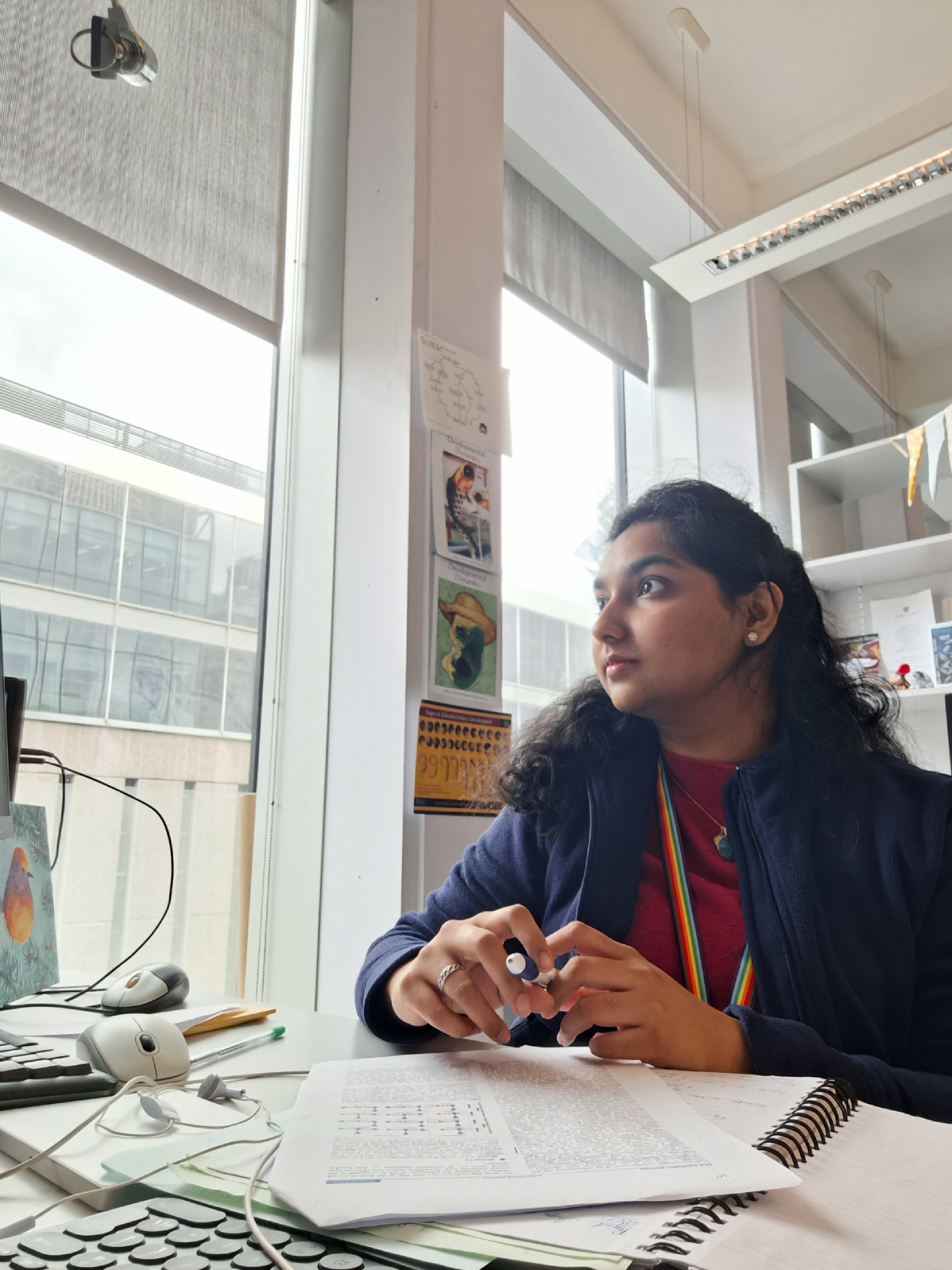Smitha Maretvadakethope

Dr Smitha Maretvadakethope, Research Associate in Theoretical Systems Biology
Dr Smitha Maretvadakethope is a postdoctoral researcher specialising in theoretical systems biology. She has a passion for curiosity-driven problems in mathematical biology and fluid dynamics. Her focus is on unravelling the fundamentals of cell dynamics, whether it be the macroscopic dynamics of active suspensions of swimming microorganisms, the fluid-structure interactions of organelles like flagella or cilia, or the underlying internal mechanisms that govern gene expression.
“Ultimately, I aspire to transition into a role as a lecturer, where I can merge my research pursuits with teaching to inspire future scientists.
I began my journey at Imperial years before starting my post as a postdoctoral researcher in Life Sciences. I first came to Imperial as an undergraduate in Mathematics in 2012. After completing my BSc, I pursued an MSc in Applied Mathematics (also at Imperial), during which I developed a passion for research. I decided to pursue a research career and set my mind to applying for PhD positions around the UK before eventually joining the Centre for Doctoral Training (CDT) in Fluid Dynamics Across Scales… at Imperial!
As I found myself at Imperial for the third time for the CDT, I completed a Master’s in Research in Fluid Dynamics and a PhD in Mathematics. My PhD was on “Synchronisation and dynamics of model cilia and flagella,” work which was inspired by the weird and wonderful world of microalgae locomotion."
 After her studies, Smitha became a postdoctoral research associate at the University of Liverpool, investigating how shape, shear, and diffusion affect microswimmer suspension dynamics, using stochastic cell modelling and probability density continuum modelling.
After her studies, Smitha became a postdoctoral research associate at the University of Liverpool, investigating how shape, shear, and diffusion affect microswimmer suspension dynamics, using stochastic cell modelling and probability density continuum modelling.
Transitioning from bioactive fluid dynamics, she redirected her focus to systems biology and returned to Imperial where she now works with Ruben Perez-Carrasco.
“Currently, I'm researching synthetic tipping points to understand gene critical timers, drawing inspiration from bacterial cell-autonomous clocks and embryonic development. My focus lies in studying coexisting critical points' control over timing dynamics amidst various noise sources, aiming to develop robust, controllable synthetic timers.
Throughout my journey, inspiration has come from all corners of life. It hasn't been the accolades of Nobel laureates or famous public figures that have inspired me, but individuals I have crossed paths with and got to know on a personal level. I have been inspired by compassionate line managers and dedicated research supervisors who saw potential in me even when I doubted myself. By tireless outreach teams, brimming with enthusiasm to share the fascinating world of science with schools to help level the playing field for girls and kids from less privileged backgrounds. And by early and later career researchers who have repeatedly proven that it is possible to have it all by having a positive work/life balance, shattering stereotypes every day, and showing me what is truly achievable. And amidst it all, my family and friends have been beacons of resilience and support, reminding me that the journey is about continuous growth. After all, much like a PhD, life in academia is a marathon and not a sprint. It is okay to not always have all the answers as long as we keep searching and doing our best on any given day.

To future women in academia, I want to emphasize the importance of resilience and kindness above all else. As an early career researcher, navigating academia can often feel like traversing a landscape of rejections and uncertainty, given the nature of fixed-term contracts, intense competition and the pressure to publish. Do not let the rejections steal your positivity or hope. Remember, the right opportunity will emerge in due time, and though the path might seem strange and circuitous, you will end up exactly where you were meant to be all along. Stay resilient, extend kindness to others and yourself, and be authentic to who you are.”


